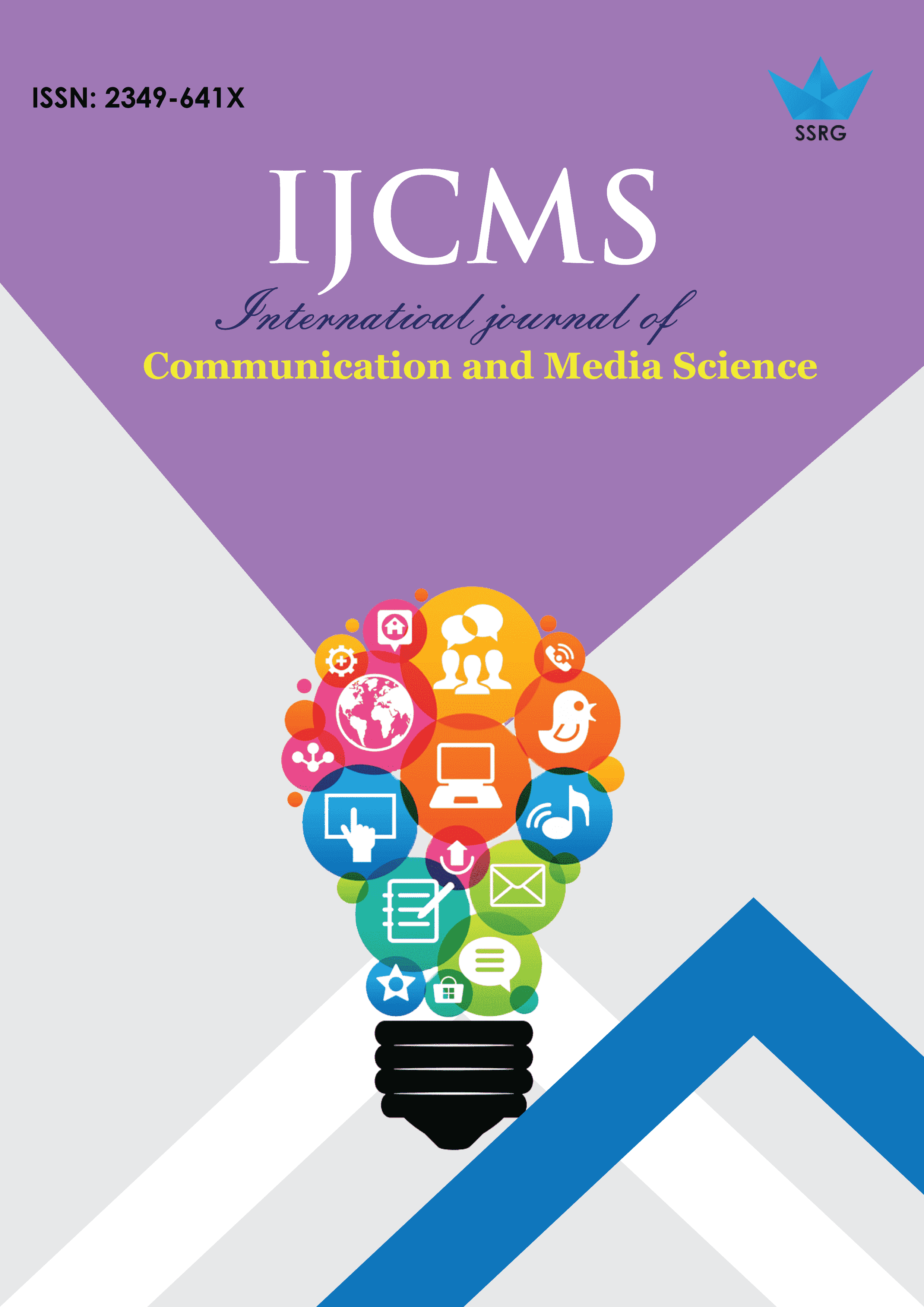Nollywood Films Representation of Cultism and Ritual Murder in Nigeria, Real or Imagined? An Audience Assessment

| International Journal of Communication and Media Science |
| © 2015 by SSRG - IJCMS Journal |
| Volume 2 Issue 2 |
| Year of Publication : 2015 |
| Authors : Cornelius A. Ukwueze, Uche Patricia Ekwugha and Chinwe Elizabeth Uzochukwu |
How to Cite?
Cornelius A. Ukwueze, Uche Patricia Ekwugha and Chinwe Elizabeth Uzochukwu, "Nollywood Films Representation of Cultism and Ritual Murder in Nigeria, Real or Imagined? An Audience Assessment," SSRG International Journal of Communication and Media Science, vol. 2, no. 2, pp. 11-24, 2015. Crossref, https://doi.org/10.14445/2349641X/IJCMS-V2I2P109
Abstract:
It has always been in doubt whether nollywood film’s representations of cultism and ritual murder is a true reflection of what actually obtains in African or Nigerian societies among various audience segments or are by product of the creative or imaginative thoughts of the film makers. This study investigates the views of Awka people of Anambra state on the reality or otherwise of these representations. Mixed methodology of Survey and Content Review was adopted. In the survey, a sample size of 400 respondents made up film viewers were randomly selected through multistage sampling from the 33 villages that make up Awka town, the capital city of Anambra State. Content Review was carried out on Simeon and Chioma Chime’s film, My Mother’s Head. Findings indicate that nollywood movies’ stories apart from lacking credibility among the Awka audiences are not true reflection of what actually goes on Nigerian societies in particular and Africa in general. A brief critic and content review of the movie, My Mother’ Head pointed at those imaginative acts, scenes, costumes and aesthetics that show “unAfricanness” in the representations of cultism and ritual murder. The study recommended proper study of story lines, dedication of script writers to their job, and emphasis at portraying the good image of the country especially to International audiences who may assimilate these stories at their face value.
Keywords:
Audience, Cultism, Nollywood, Representations, Ritual Murder
References:
[1] Akpan & Anyanuka, (2012).”The Social Construction of Reality: Analytical study of the Effect of Nollywood Movies”. Department of Mass Comm. University of Nigeria Nsukka, Society for Research.The Economist April 6,2006
[2] Ayoola, E. (2014). “Ritual killing in Nigeria: How to stop it”. Retrieved from Shaharareporters.com/2014/04/07/ritual-killings-Nigeria-how-stop-it-eric-olayinka-ayoola.
[3] Ajibade, E. (2011). “Campus Cult and Cultism”. Retrieved from https://www.behance.net/gallery/1921797/campus-cults-and-cultism.
[4] OAC PRESS, (2011). “Ritual Murder? Retrieved from Openthcoop.net/press/2011/03/02/ritual-murder.ww w.I.word.com/dictionary/ritual%20murder
[5] Igwe, L. (2004). “Ritual Killing and Pseudoscience in Nigeria”. Retrieved from www.Csocop.org/sb/show/ritual-killing_and pseudoscience in Nigeria.
[6] Alawode & Uduakobong, (2013). Home video as Nigeria Image Maker. European Scientific Jounal Vol 9, (11) 2013.
[7] Kumwenda, G. (2008). “The portrayal of witchcraft, occult and magic in popular Nigeria video film” Retrieved from http://wiredspace.wits.ac.za/handle/10539/4592
[8] Esan, O. (2008). “Appreciating Nollywood: Audiences and Nigeria Films”. Participation Vol5,(1).
[9] Ogunade, R. (2002). “Secret Societies and- ocultic activities in Nigeria tertiary institutions” in leading issues in- General Studies, University of Ilorin Press. Retrieved from http://www.Unilorin.edu.ng/publication/jekanyinoluwa/book%208.%20CULT%20ACTIVITIES%20IN%20THE%20NIGERIA%20INSTITUTION%20%20OF%20HIG
[10] Carrasco, D. (2000). “City of Sacrifice: The Aztec Empire and the Role of Violence in Civilization, Moughton Mifflin
[11] Ugor, P. (2009).”Small media, Popular Culture, and New Youth Spaces in Nigeria. Review of Education, Pedagogy & Cultural studies Vol 31(4): 381-408.
[12] Mbembe, A. (2002). “African modes of self writing”. Public Culture Vol 14(1): 239-73
[13] Meyer, B. (1998).” The Power of Money: Politics, Occult Force, and Pentecostalism in Ghana, African Studies Review Vol41 (3) :15-37
[14] Hall, S. (1980). “Encoding/Decoding”. In Centre for Contemporary Cultural Studies (Ed): Culture, media, language, London: Hutchinson.
[15] Jones, T. (2013). Media Studies Theories: Reception Analysis (Media from its Audience perspective). Retrieved from Prezi.com/19wnjyd3xhe4/media-studies-theories-reception-analysis/
[16] Ekwuazi, H. (2009). Nollywood: why audience is the driving force.
[17] Oxford Advance Learner’s Dictionary (7th Edition).

 10.14445/2349641X/IJCMS-V2I2P109
10.14445/2349641X/IJCMS-V2I2P109